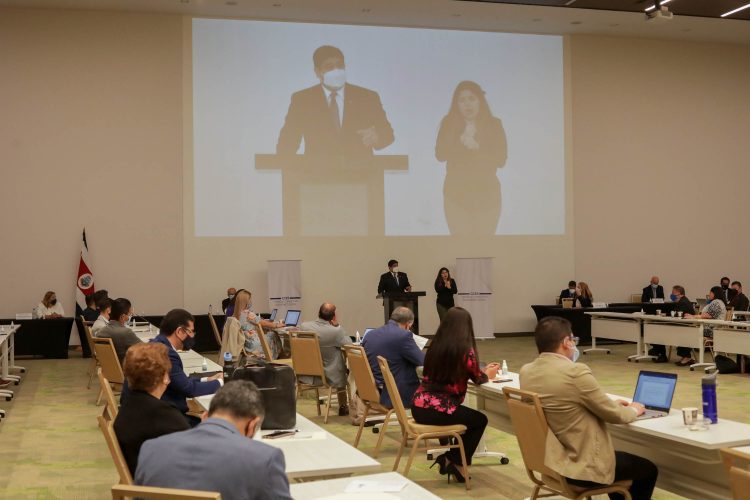The president of Costa Rica presided over the installation of the Economic and Social Consultative Council, with the presence of the European Union ambassador in the country, as a sign of EUROsociAL+’s support for the creation of this body for social dialogue.

Photo courtesy of the Office of the Presidency of Costa Rica. Author: Ro Sánchez
Last Friday, 27 October, saw the constitution of Costa Rica’s Economic and Social Consultative Council. The body, created by Executive Decree 42763 of 17 December 2020, incorporates civil society in public policy decisions, showing the great progress made by the country in enriching its democracy. The event was led by the President of the Republic, Carlos Alvarado Quesada, and the ministers and vice ministers of the Office of the Presidency, Labour and Social Security and of National Planning and Economic Policy were also present.
The creation and installation of the Economic and Social Consultative Council is a historical milestone in the country responding to more than 20 years of demands from civil society for organic representation, which would enable the government to offer active debate, analysis and the proposal of actions, programmes and public policies. The Council is made up of 54 representatives from different social, business, union, religious, academic sectors, as well as others from general civil society. Each took a solemn and committed oath on assumption of office. The Office of the Presidency was headed by José Zaglul, a prominent academic and former rector of EARTH University.
The EUROsociAL+ Programme, together with the Ministry of the Presidency, has accompanied the process of creating this agency for many years, and more intensively as of November 2020, technically assisting in its formation in direct relation to the requirements of the country. It specifically promoted knowledge of different models of European and Latin American Economic and Social Consultative Councils, posing questions to optimise and improve representation. It also analysed the structure and functions that best represented the country, marking the first steps towards the regulation of the Council.
The EU ambassador to Costa Rica, María Antonia Calvo, also took part in the event, highlighting the programme’s involvement in this successful process. The Programme’s main expert in this matter, Beatriz Martín Nieto, then gave a keynote talk about what is and what is not an Economic and Social Council and specifically on why its existence and operation are so important.
The event was very emotive for all attendees, undoubtedly due its significance to the extent that democracy in the country and the management of its institutions will no longer be the same, but will be much improved. In the words of the president, “the creation of a space for dialogue with such diverse and numerous sources of social representation is a milestone in our democratic culture. Furthermore, it is a sign of our maturity as a society, which knows that there is only one way forward: together”
In the second part of the ceremony, the first working session of the council was held, signally the start of an operational and programmatic journey.
During the coming months, EUROsociAL will continue its support specially to encourage the regulatory process and the drafting of an operational protocol, as well as promoting the training of CCES members of the Secretariat and of the board through peer exchange.



